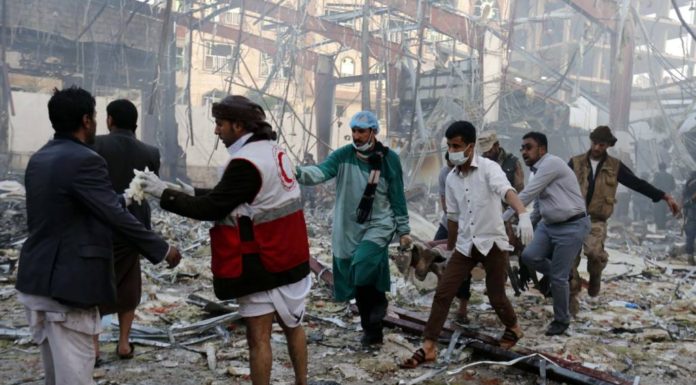PHOTO: Rescuers carry a body from the scene of the Saudi-led airstrike on a funeral in Yemen’s capital Sana’a, October 8, 2016
Saudi Arabia has admitted last weekend’s bombing of a funeral ceremony in Yemen which killed at least 140 people and wounded more than 500.
The Saudi military has denied through the week that its warplanes struck the ceremony. High-level officials of the Ansar al-Allah (Houthi) movement, which controls the Yemeni capital Sana’a, were among mourners for the father of the Houthi Interior Minister.
However, on Saturday the Saudi-led coalition, which began air and ground operations against the Houthis in March 2015, said that its warplanes had attacked. They blamed “false information”, provided by Yemeni officials, that indicated the presence of armed insurgent leaders.
See also Yemen Feature: A Guide to the Civil War
Yemen Feature: 140+ Killed by Saudi Bombing of Funeral
The bombing has mobilized international attention to Yemen’s crisis, spurred by the Houthi seizure of power in early 2015. The Hadi Government — which ended Ali Abdallah Saleh’s 33-year rule in 2012 after mass protests — fled to the southern port city of Aden.
Since then, more than 9,000 civilians have been killed and many are at risk of malnutrition and famine, in part because of a Saudi-led naval blockade.
Amid criticism of Saudi Arabia after the attack on the funeral, the US announced “an immediate review” of its support for the coalition. Human rights organizations, who have called the bombing “an apparent war crime”, and some American lawmakers are demanding an immediate suspension of of weapons sales to Riyadh.
See also Iran Daily, Oct 15: “US and Britain Supporting Saudi Crimes in Yemen”
“Unfortunate and Painful Event”
In its statement, an investigating committee said it had examined the “unfortunate and painful event” and concluded that an unidentified party, affiliated with the Yemeni military, had passed along the reports that armed rebel leaders were at the funeral.
A warplane immediately carried out the strike, before procedures devised to protect civilian sites were followed, because of the belief that the hall was “a legitimate military target”, the statement said.
“The site was wrongly targeted, which resulted in the wounding and loss of civilian souls,” the committee said. It said that those responsible would face “the necessary legal procedures” and that the coalition should provide “appropriate compensation” to the wounded and to the relatives of the dead.
In a separate statement, the coalition said it accepted the conclusions and would carry out the recommendations.
General Ahmed Asiri, an advisor to the Saudi defense minister, said, “The important mission now is to modify the path and review the rules of engagement to make sure such errors which are not compatible with the principles of the alliance, which aims to serve the citizens, will not happen again.”

